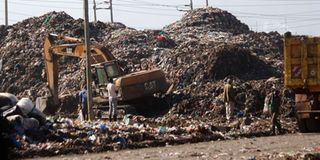Waste pickers deserve recognition, acceptance same as other workers

A caterpillar tractor ploughs through a mountain of garbage at Dandora dumpsite in Nairobi.
What you need to know:
- They rid our homes of garbage and help keep our cities clean.
- These men and women are the unsung heroes of our urban centres.
Recent photos of waste pickers at the Dandora dumpsite donning used and disposed Covid-19 personal protective equipment (PPEs) for their day job lit up social media.
In this pandemic, waste workers are at great risk of contracting and spreading the virus.
These men and women are the unsung heroes of our urban centres. Long before Covid-19 landed on our shores, these individuals were already frontline workers ridding our homes of garbage and keeping our cities clean.
However, in a sector that remains largely unregulated by county governments, these waste managers are not accorded adequate protection.
Research shows that frequent exposure to smoke and heavy-metal fumes leads to respiratory complications, cancer, and kidney failures.
Moreover, stray needles and sharp objects make waste pickers susceptible to cuts, injuries, and contracting Hepatitis C and HIV.
Hazardous environment
The majority cannot afford healthcare and end up being ravaged by terminal illnesses they contract while working in their hazardous environment.
With no regulation, compensation, healthcare benefits and protective gear, these workers are forced to toil in inhumane conditions.
Even as the country makes improvements such as the prospective Dandora waste-to-energy plant and the plastics ban, we must begin to recognise waste pickers as a vital part of the workforce and treat them as such.
We must sensitise our citizens, particularly the youth, on public sanitation. We must also call on lawmakers to use their platform and influence to ask major players like industries and the private sector to uphold waste workers’ rights.
We must go down to the dumpsites and start having conversations with the garbage collectors, asking them what they need in order to improve their working conditions, and develop sustainable ways of meeting those needs.
We must also educate them on how to protect themselves at work. We must stop confusing them with waste, and accord them the dignity they deserve.
Faith Murei, 19, is a King-Morgridge Scholar at the University of Wisconsin-Madison.
Are you aged 10-20 and would like to be Nation’s young reporter? Email your 400-600-word article to [email protected]




